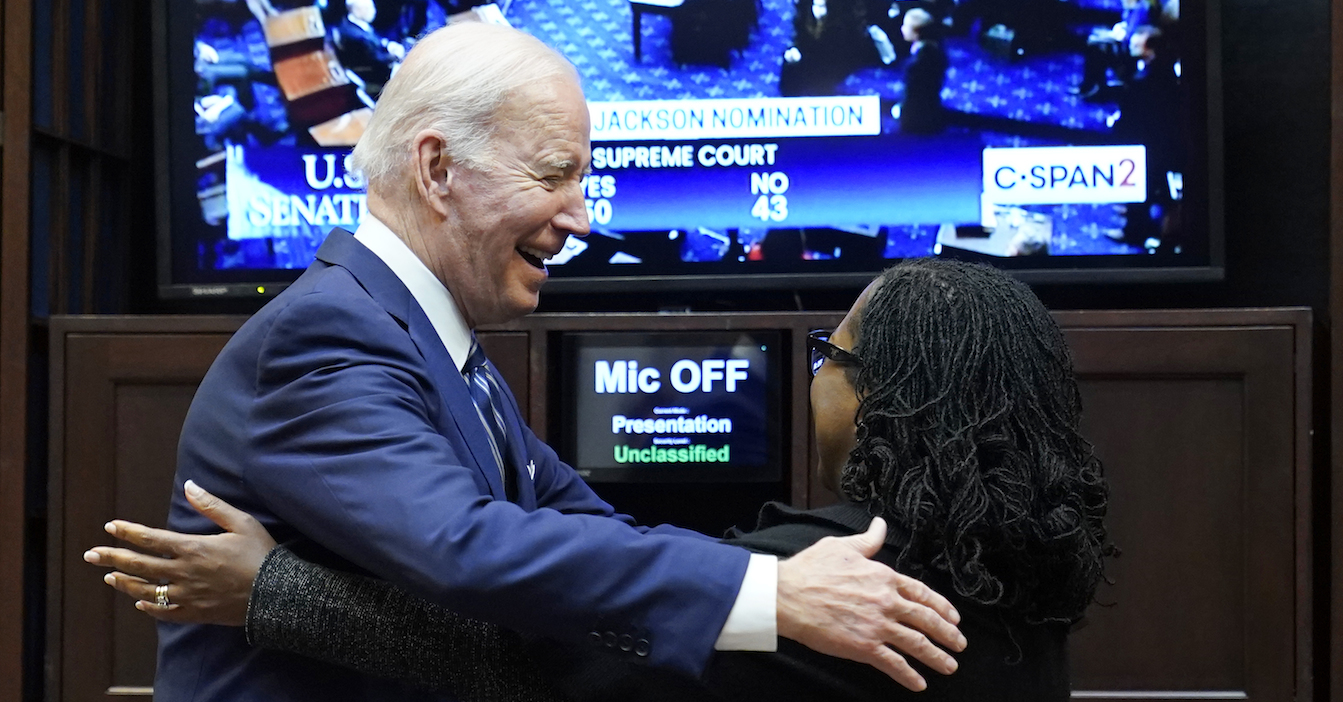Three Republicans joined Democrats' narrow Senate majority on Thursday to confirm Ketanji Brown Jackson to the Supreme Court, making her the first Black woman justice in the nation's history.
The chamber erupted in cheers and applause when Vice President Kamala Harris, who presided over the roll call vote, announced the results, while Jackson hugged President Biden, with whom she had watched the proceedings in the Roosevelt Room of the White House.
"One step at a time, this majority is expanding the possibility of who merits consideration to the bench," Senate Majority Leader Chuck Schumer said in remarks broadcast on C-SPAN before his colleagues began voting. "We certainly have a long road to go on the way to true justice, but today we are taking a bold step toward full realization of our country's promise."
Republican Sens. Susans Collins of Maine, Lisa Murkowski of Alaska and Mitt Romney of Utah, who had joined Democrats in breaking a Judiciary Committee deadlock on the nomination earlier this week, voted to confirm her on Thursday.
Jackson's "qualifications and her record demonstrate her knowledge and respect for the Constitution," Murkowski said after the votes were counted. "I congratulate her on this achievement and celebrate her historic confirmation with Americans.
Jackson previously served on the U.S. District Court for the District of Columbia and currently sits on the D.C. Circuit Court of Appeals. She won bipartisan support in the Senate for both positions before drawing almost-unanimous GOP opposition, much of it hostile, during four grueling days of Judiciary Committee hearings.
Her confirmation was a "historic moment for our nation," Biden said in a Twitter post accompanied by a photo of him taking a selfie with Jackson. "She will be an incredible justice, and I was honored to share this moment with her."
The White House has planned a ceremony marking the event on Friday.
Jackson will succeed Justice Stephen Breyer, the senior member of the court’s liberal wing and a jurist for whom she clerked at the end of the court's current term in June.
Breyer announced his retirement in January amid concern by Democrats that if he didn’t do so, Republicans would block any nominees by President Biden if they regained control of the chamber in November's mid-term elections.
'We'll talk about judges differently'
A similar refusal to consider the nomination by former President Barack Obama in 2016 of then-Judge Merrick Garland gave his successor, Donald Trump, the opportunity to appoint three justices to the high court. Trump’s selections established a 6-3 conservative majority that appears poised to significantly curtail, or even overturn, the abortion rights provided under 1973’s Roe v. Wade.
Sen. Lindsey Graham, a South Carolina Republican who sits on the Judiciary Committee, reinforced Democrats’ concerns on Monday in a brief but bitter statement explaining his opposition to Jackson.
“The process you started to go to a simple majority vote is going to rear its head here pretty soon where we’re in charge,” he said, referring to the party’s decision during the Obama era to stop requiring a 60-vote supermajority in lower court nominations, an alteration the GOP later extended to the Supreme Court. “Then we’ll talk about judges differently.”
Graham, who supported blocking consideration of Garland’s nomination in February 2016 - arguing that it was too close to a presidential election nine months later - nonetheless voted to confirm Justice Amy Coney Barrett, whom Trump nominated a little more than a month before losing the 2020 election.
'AMERICA AT ITS BEST'
Senate Minority Leader Mitch McConnell, the Kentucky Republican who until the 2020 election was majority leader, masterminded both maneuvers.
This week, he cited a litany of grievances over Democratic treatment of Republican nominees including Robert Bork in 1987 and Justice Clarence Thomas in 1991. Republicans also claimed that Jackson had been too lenient in sentencing criminals and questioned how she might influence the court's interpretation of federal law.
"For judicial nominees, their philosophy about how to decide cases ought to be a primary consideration," Sen. Chuck Grassley of Iowa, the senior Republican on the Judiciary Committee, said Thursday. "Part of having a judicial philosophy is having an understanding of fundamental principles of the constitution. Natural rights are a part of that system. Judge Jackson explained to us that she does not hold a position on whether individuals possess natural rights. That ought to be very shocking."
Earlier in the week, however, Sen. Sheldon Whitehouse, a Rhode Island Democrat, said Republicans' focus on judicial philosophies has been a facade for the GOP's social agenda.
"Let’s not pretend that a judicial philosophy is a neutral thing," Whitehouse said. "It is a tool and when a judge says he or she has one, it’s worth looking into."
Originalism, the philosophy espoused by the GOP of interpreting the Constitution as its authors understood it, "works very nicely for you if you’d like to look back before the Civil Rights movement in making decisions about civil rights," he said.
"Originalism works very well for you if you’d like to look back before industrial regulation at a time when there was no industry big enough to regulate and serve the interests of corporate deregulation," Whitehouse continued. "Originalism works very well for you if you want to return to old social norms that society has moved beyond."
His party, overall, has praised Jackson as eminently qualified for the Supreme Court and complimented her composure in the face of criticism from GOP members of the Judiciary Committee.
"She is America at its best," Sen. Raphael Warnock, a Georgia Democrat, said Thursday. "Under intense questioning before the committee, much of it appropriate and necessary, some of it outrageous and beyond the pale, she demonstrated her legal acumen, sharp intellect and the kind of temperament we need on the bench, especially at a time like this."


